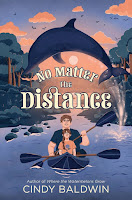February 21st 2023 by HarperCollins US
E ARC provided by Edelweiss Plus
In this novel in verse, we meet Penny Rooney, who lives with her parents, a school secretary and a respiratory therapist, and older sister Liana, who loves music and is very nice to her. Their house near Durham has a creek near it where the girls like to hang out. It's halfway through 6th grade for Penny, and she enjoys hanging out with her best friend, Cricket. She also has some challenges with cystic fibrosis, which leads to problems with food and nutrition, breathing issues, and more infections than most people have. Everyone says she's "lucky" in that she is generally healthy, but she doesn't feel that way. When she and Liana are swimming in the creek, they see a dolphin. At first, they can hardly believe it; they think they are hallucinating, but they see the animal again. When their parents find out, they call a scientist, Dr. Zhao, who comes to observe and test the dolphin, and tries to think of ways to get it back to the ocean. Penny feels a strong connection to the dolphin, whom she names Rose, and is conflicted about returning it to the sea, especially when she finds out that Cricket is going to move four hours away. Penny is also thinking a lot about a school project to write an identity poem for a poetry slam. She has a lot more time to think when she gets a cold that escalates into a bad infection. At first, she's on a course of antibiotics, but when she starts to cough up blood, it's time to go to the hospital. She doesn't want to spend time away from Rose and Cricket, since they will both be leaving soon, but the infection is hard to fight, and her health needs to take precedence. Rose has a similar infection, due to being inland and inhaling dirty water, and has to have treatment as well. When the dolphin is well enough to make the trip back to the sea, it seems unwilling to go. Dr. Zhao feels that perhaps Rose has made a connection to Penny, and suggests that Penny help the team convince Rose to return to her pod. Will Penny be well enough to make this happen?
Strengths: There are very few books about children with cystic fibrosis, and even if there are older titles, treatments and prognoses for patients with this disease are changing all the time. Baldwin, who has CF, has written several other titles, including Where the Watermelons Grow. It's great that she finally worked her personal experiences into a book. It's great that the book is more about rescuing the dolphin, preparing for the poetry slam, and dealing with Cricket's move than about the CF. That's certainly in the picture, but it's the backdrop against which the story plays out. It used to be that books like this were more about the conditions than the person, and I'm so glad this is not the case as much. Baldwin's poetry is every bit as good as her prose, the story moves along quickly, and there are good details about the health struggles that will enlighten readers who don't know what CF patients face.
Strengths: There are very few books about children with cystic fibrosis, and even if there are older titles, treatments and prognoses for patients with this disease are changing all the time. Baldwin, who has CF, has written several other titles, including Where the Watermelons Grow. It's great that she finally worked her personal experiences into a book. It's great that the book is more about rescuing the dolphin, preparing for the poetry slam, and dealing with Cricket's move than about the CF. That's certainly in the picture, but it's the backdrop against which the story plays out. It used to be that books like this were more about the conditions than the person, and I'm so glad this is not the case as much. Baldwin's poetry is every bit as good as her prose, the story moves along quickly, and there are good details about the health struggles that will enlighten readers who don't know what CF patients face.
Weaknesses: Novels in verse are great, but they also don't have the details that regular novels do. They are also a hard sell with the students in my school, although I know this is not necessarily the case elsewhere.
What I really think: If you have Ethridge's 1985 Toothpick, or Bennett's 1992 Goodbye, Best Friend, it's definitely time to weed them. Thirty years ago, CF was considered a terminal disease, but improvements in treatment have raised life expectancy a lot. I'm glad that there are books that depict children dealing with health issues that aren't in the Lurlene McDaniel school of "everybody dies in the end".

What I really think: If you have Ethridge's 1985 Toothpick, or Bennett's 1992 Goodbye, Best Friend, it's definitely time to weed them. Thirty years ago, CF was considered a terminal disease, but improvements in treatment have raised life expectancy a lot. I'm glad that there are books that depict children dealing with health issues that aren't in the Lurlene McDaniel school of "everybody dies in the end".



























No comments:
Post a Comment